2013年北京中考二模英语试题及答案
- 格式:doc
- 大小:2.20 MB
- 文档页数:66
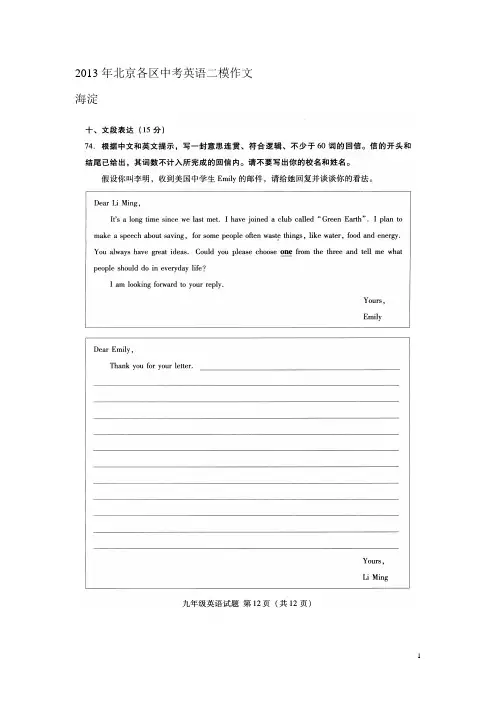
2013年北京各区中考英语二模作文海淀Dear Emily,Thank you for your letter. I’m glad to share my ideas with you. What you are doing in the “Green Earth” club is meaningful.I am also strongly against any kind of wasting. With such a large population in China, food is especially precious. People should be encouraged to eat at home. In this way, the leftovers can be the next day’s meal and much less food would be wasted. If people do have to eat outside and there is food left, they should take it home and eat it later.I believe it’s our duty to protect our earth. Actually it is not that difficult. A little more attention from everyone in daily life will be of great help.Yours,Li Ming朝阳74. 成长中每个人都要面对烦恼,解决问题。
假如你叫李海,是美国中学生汤姆的朋友。
你收到他的电子邮件,请给他回复,回答他的问题,提出你的建议,并就此事谈谈你的看法。
Hi! Li Hai,I’m so sad. Peter is a close friend of mine. He invited me to his birthday party this Saturday. If I go, I know we will do nothing but play computer games. I don’t like them. Besides, I have to work on my science report because it must be finished this weekend. But if I refuse, he must be upset. I don’t know what to do. Do you have the same problem? I need your help.I’m looking forward to hearing from you soon.Yours,TomHi! Tom,I’m glad to hear from you._____________________________________________________I hope what I said can help you.Yours,Li HaiHi! Tom,I’m glad to hear from you. Yes, I sometimes have the same problem.I think you’d better go to Peter’s birthday party since he is your close friend. You can choose to play other games such as chess if you don’t like playing computer games. You don’t need to worry too much about the science report. You can finish it on Sunday. I’m sure you can manage it. But if you don’t go to the party, I’m afraid you may lose your friend.Although it’s true that sometimes people’s needs are different, remember friends can always stand beside you. We must understand and care each other.I hope what I said can help you.Yours,Li Hai西城74. 根据英文题目和中文提示,写出意思连贯、符合逻辑、不少于60词的短文。
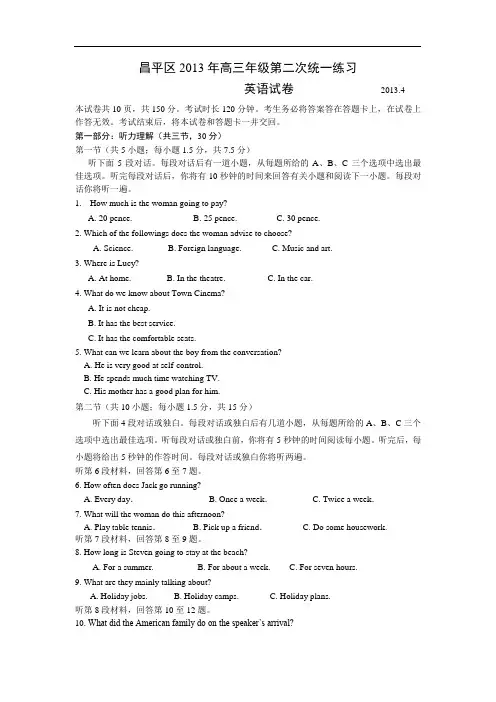
昌平区2013年高三年级第二次统一练习英语试卷2013.4本试卷共10页,共150分。
考试时长120分钟。
考生务必将答案答在答题卡上,在试卷上作答无效。
考试结束后,将本试卷和答题卡一并交回。
第一部分:听力理解(共三节,30分)第一节(共5小题;每小题1.5分,共7.5分)听下面5段对话。
每段对话后有一道小题,从每题所给的A、B、C三个选项中选出最佳选项。
听完每段对话后,你将有10秒钟的时间来回答有关小题和阅读下一小题。
每段对话你将听一遍。
1.How much is the woman going to pay?A. 20 pence.B. 25 pence.C. 30 pence.2. Which of the followings does the woman advise to choose?A. Science.B. Foreign language.C. Music and art.3. Where is Lucy?A. At home.B. In the theatre.C. In the car.4. What do we know about Town Cinema?A. It is not cheap.B. It has the best service.C. It has the comfortable seats.5. What can we learn about the boy from the conversation?A. He is very good at self-control.B. He spends much time watching TV.C. His mother has a good plan for him.第二节(共10小题;每小题1.5分,共15分)听下面4段对话或独白。
每段对话或独白后有几道小题,从每题所给的A、B、C三个选项中选出最佳选项。
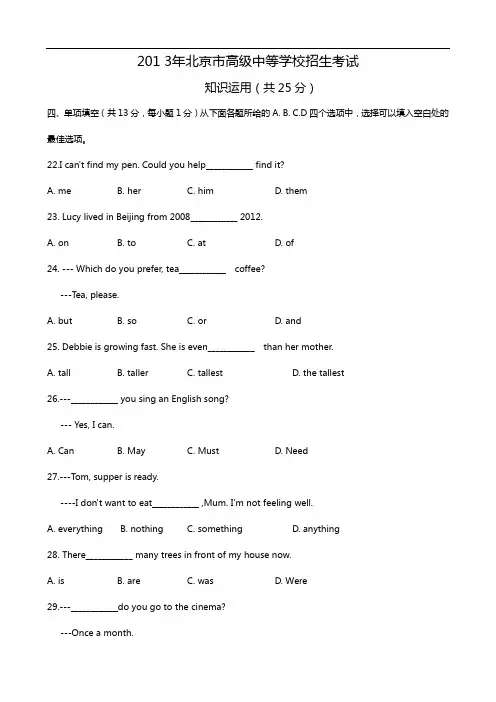
201 3年北京市高级中等学校招生考试知识运用(共25分)四、单项填空(共13分,每小题1分)从下面各题所给的A. B. C.D四个选项中,选择可以填入空白处的最佳选项。
22.I can't find my pen. Could you help____________ find it?A. meB. herC. himD. them23. Lucy lived in Beijing from 2008____________ 2012.A. onB. toC. atD. of24. --- Which do you prefer, tea____________ coffee?---Tea, please.A. butB. soC. orD. and25. Debbie is growing fast. She is even____________ than her mother.A. tallB. tallerC. tallestD. the tallest26.---____________ you sing an English song?--- Yes, I can.A. CanB. MayC. MustD. Need27.---Tom, supper is ready.----I don't want to eat____________ ,Mum. I'm not feeling well.A. everythingB. nothingC. somethingD. anything28. There____________ many trees in front of my house now.A. isB. areC. wasD. Were29.---____________do you go to the cinema?---Once a month.A. How longB. How farC. How oftenD. How much30. Mr. Green, a famous writer, ____________ our school next week.A. visitedB. visitsC. was visitingD. will visit31. Our teacher often asks us____________ questions in groups.A. discussB. to discussC. discussingD. discussed32. Miss Lin____________ a lot of work for the poor area since 2010.A. doesB. didC. has doneD. will do33. Flowers____________ along the road last year.A. plantB. plantedC. are plantedD. were planted34.I don't remember____________ the book yesterday.A. where I putB. where did I putC. where will I putD. where l will put五、完形填空(共12分,每小题1分)阅读下面的短文,掌握其大意,然后从短文后各题所给的A. B. C.D四个选项中,选择最佳选项。
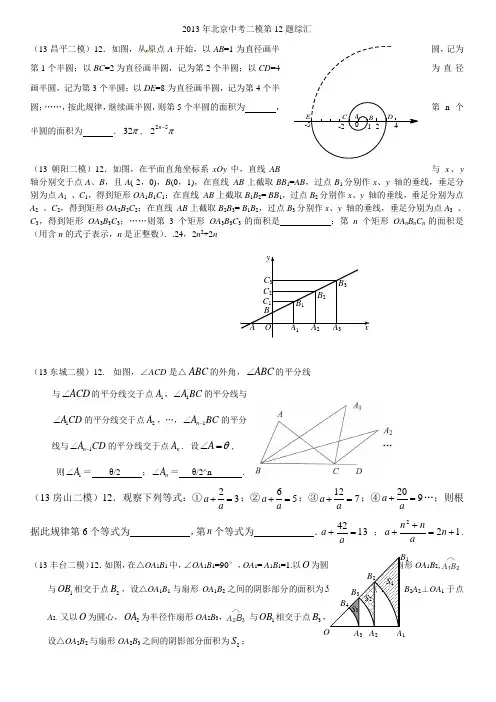
2013年北京中考二模第12题综汇(13昌平二模)12.如图,从原点A 开始,以AB =1为直径画半圆,记为第1个半圆;以BC =2为直径画半圆,记为第2个半圆;以CD =4为直径画半圆,记为第3个半圆;以DE =8为直径画半圆,记为第4个半圆;……,按此规律,继续画半圆,则第5个半圆的面积为 ,第n 个半圆的面积为 .32π, 252n π-(13朝阳二模)12.如图,在平面直角坐标系xOy 中,直线AB 与x 、y 轴分别交于点A 、B ,且A (-2,0),B (0,1),在直线 AB 上截取BB 1=AB ,过点B 1分别作x 、y 轴的垂线,垂足分别为点A 1 、C 1,得到矩形OA 1B 1C 1;在直线 AB 上截取B 1B 2= BB 1,过点B 2分别作x 、y 轴的垂线,垂足分别为点A 2 、C 2,得到矩形OA 2B 2C 2;在直线 AB 上截取B 2B 3= B 1B 2,过点B 3分别作x 、y 轴的垂线,垂足分别为点A 3 、C 3,得到矩形OA 3B 3C 3;……则第3个矩形OA 3B 3C 3的面积是 ;第n 个矩形OA n B n C n 的面积是 (用含n 的式子表示,n 是正整数)..24,2n 2+2n(13东城二模)12. 如图,∠ACD 是△ABC 的外角,ABC ∠的平分线与ACD ∠的平分线交于点1A ,1A BC ∠的平分线与 1ACD ∠的平分线交于点2A ,…,1n A BC -∠的平分 线与1n A CD -∠的平分线交于点n A . 设A θ∠=, 则1A ∠= θ/2 ;n A ∠= θ/2^n .(13房山二模)12.观察下列等式:①23a a +=;②65a a +=;③127a a+=;④209a a +=…;则根据此规律第6个等式为 ,第n 个等式为 .1342=+a a ; 122+=++n ann a . (13丰台二模)12.如图,在△OA 1B 1中,∠OA 1B 1=90°,OA 1= A 1B 1=1.以OOA 1B 2,⌒A 1B 2与1OB 相交于点2B ,设△OA 1B 1与扇形OA 1B 2之间的阴影部分的面积为B 2A 2⊥OA 1于点A 2,又以O 为圆心,2OA 为半径作扇形OA 2B 3,⌒A 2B 3 与1OB 相交于点3B 设△OA 2B 2与扇形OA 2B 3之间的阴影部分面积为2S ;1123按此规律继续操作,设△OA n B n 与扇形OA n B n +1之间的阴影部分面积为n S .128π-; 2122n n π+-则S 1=___________; S n = .(13海淀二模)12.已知:n x ,'n x 是关于x 的方程244=0n n n a x a x a n -+-1()n n a a +>的两个实数根,'n n x x <,其中n 为正整数,且1a =1.(1)11'x x -的值为 ;(2)当n 分别取1,2,⋅⋅⋅,2013时,相对应的有2013个方程,将这些方程的所有实数根按照从小到大的顺序排列,相邻两数的差恒为(11'x x -)的值,则20132012'x x -= 2;8048 .(13门头沟二模)12.如图,将边长为2的正方形纸片ABCD 折叠,使点B落在CD 上,落点记为E (不与点C ,D 重合),点A 落在点F 处,折痕MN 交AD 于点M ,交BC 于点N .若12CE CD =,则BN 的长是 ,AM BN 的值 等于 ;若1CE CD n=(2n ≥,且n 为整数), 示).22(1)1n n -+则AM BN 的值等于 (用含n 的式子表(13密云二模)12如图1,将一个正六边形各边延长,构成一个正六角星形AFBDCE ,它的面积为1;取△ABC和△DEF 各边中点,连接成正六角星形A 1F 1B 1D 1C 1E 1,如图(2)中阴影部分;取△A 1B 1C 1和△D 1E 1F 1各边中点,连接成正六角星形A 2F 2B 2D 2C 2E 2,如图(3)中阴影部分;如此下去…,则正六角星形A 4F 4B 4D 4C 4E 4的面积为_______1256__________.(13石景山二模)12.如图,45AOB ∠=,过OA 上到点O 的距离分别为1,4,7,10,13,16,…的点作OA的垂线与OB 相交,得到并标出一组黑色梯形,它们的面积分别为,,,321s s s …,观察图中的规律,第4个黑色梯形的面积=4S ,第n (n 为正整数)个黑色梯形的面积=n S .2123;)(71223-n .(13西城二模)12.如图,在平面直角坐标系xOy 中,点点B 在x 轴的正半轴上,∠OAB =90°.⊙P 1是△OAB 的内切圆,且P 1的坐标为(3,1).(1) OA 的长为 ,OB 的长为 ;(2) 点C 在OA 的延长线上,CD ∥AB 交x 轴于点D .将⊙P 1沿水平方向向右平移2个单位得到⊙P 2,将⊙P 2沿水平方向向右平移2个单位得到⊙P 3,按照同样的方法继续操作,依次得到⊙P 4,……⊙P n .若⊙P 1,⊙P 2,……⊙P n 均在△OCD 的内部,且⊙P n 恰好与CD 相切,则此时OD 的长为 .(用含n 的式子表示)2n +3A BCDEFMN 图1 D 图3(13顺义二模)12.正方形111A B C O , 2221A B C C ,,3332A B C C , …按如图所示的方式放置.点1A ,2A ,3A ,…和点1C ,2C ,3C …分别在直线(0)y kx b k =+>和x 轴上,已知点1(1,1)B ,2(3,2)B ,则点6B 的坐标是 ,点n B 的坐标是 .6(63B ,32) ,1(21,2)n n n B -- .(13大兴二模)12. 如图,已知EF 是O 的直径,把A ∠为60的直角三角板ABC 的一条直角边BC 放在直线EF 上,斜边AB 与O 交于点P ,点B 与点O 重合.将三角板ABC 沿OE 方向平移,使得点B 与点E 重合为止.设POF x ∠=,则x 的取值范围是 3060x ≤≤(13怀柔二模)12. 如12题图1个方向:东、南、西、北、东南、东北、西南、西北,方向线交点为O ,以O 为圆心、等距的圆由内向外分别称作1、2、3、……n.将点所处的圆和方向称作点的位置,例如M(2,西北),N(5,南),则P 点位置为( , ).如12题图2,若将(1,东)标记为点A 1,在圆1上按逆时针方向旋转交点依次标记为A 2、A 3、…、A 8;到A 8后进入圆2,将(2,东)标记为A 9,继续在圆2上按逆时针方向旋转交点依次标记为A 10、A 11、…、A 16;到A 16后进入圆3,之后重复以上操作过程.则点A 25的位置为( , ),点A 2013的位置为( , ),点A 16n+2(n 为正整数)的位置为( , ),(3,东北),(4,东),(252,西),(2n+1,东北)A。
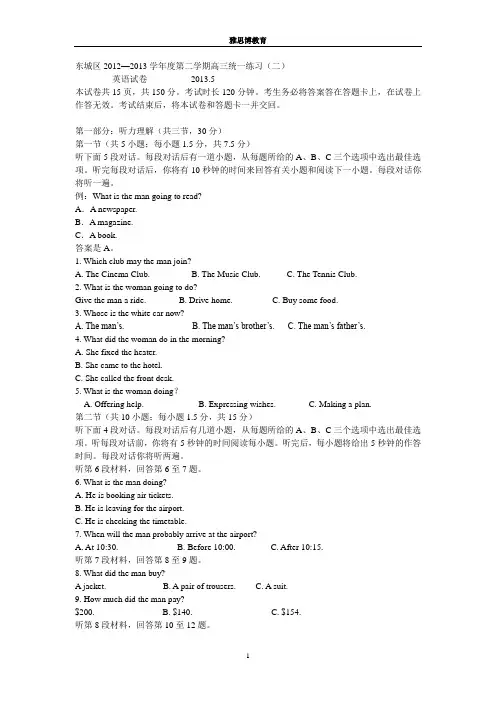
东城区2012—2013学年度第二学期高三统一练习(二)英语试卷2013.5本试卷共15页,共150分。
考试时长120分钟。
考生务必将答案答在答题卡上,在试卷上作答无效。
考试结束后,将本试卷和答题卡一并交回。
第一部分:听力理解(共三节,30分)第一节(共5小题;每小题1.5分,共7.5分)听下面5段对话。
每段对话后有一道小题,从每题所给的A、B、C三个选项中选出最佳选项。
听完每段对话后,你将有10秒钟的时间来回答有关小题和阅读下一小题。
每段对话你将听一遍。
例:What is the man going to read?A.A newspaper.B.A magazine.C.A book.答案是A。
1. Which club may the man join?A. The Cinema Club.B. The Music Club.C. The Tennis Club.2. What is the woman going to do?Give the man a ride. B. Drive home. C. Buy some food.3. Whose is the white car now?A. The man’s.B. The man’s brother’s.C. The man’s father’s.4. What did the woman do in the morning?A. She fixed the heater.B. She came to the hotel.C. She called the front desk.5. What is the woman doing?A. Offering help.B. Expressing wishes.C. Making a plan.第二节(共10小题;每小题1.5分,共15分)听下面4段对话。
每段对话后有几道小题,从每题所给的A、B、C三个选项中选出最佳选项。
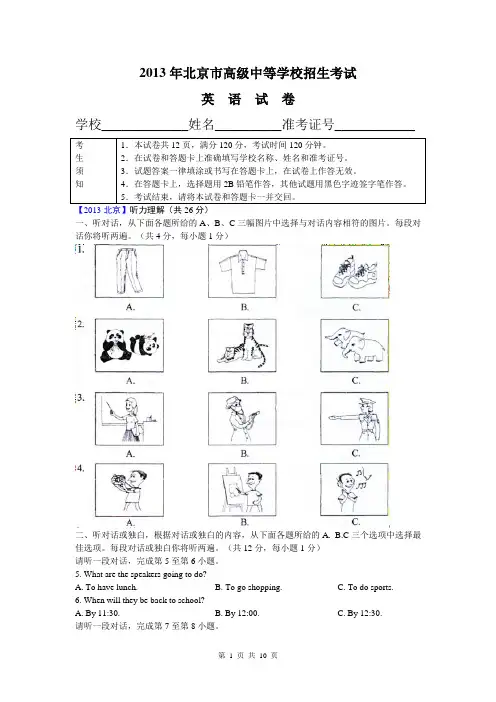
2013年北京市高级中等学校招生考试英语试卷学校_____________姓名__________准考证号____________一、听对话,从下面各题所给的A、B、C三幅图片中选择与对话内容相符的图片。
每段对话你将听两遍。
(共4分,每小题1分)二、听对话或独白,根据对话或独白的内容,从下面各题所给的A. B.C三个选项中选择最佳选项。
每段对话或独白你将听两遍。
(共12分,每小题1分)请听一段对话,完成第5至第6小题。
5. What are the speakers going to do?A. To have lunch.B. To go shopping.C. To do sports.6. When will they be back to school?A. By 11:30.B. By 12:00.C. By 12:30.请听一段对话,完成第7至第8小题。
7. How does the woman feel?A.A little nervous.B.A little sad.C.A little worried.8. Where is the woman going?A. England.B. America.C. Canada.请听一段对话,完成第9至第10小题。
9. How is the man going to the City Hall?A. By bike.B. By car.C. By bus.10. Where is the City Hall?A. On Park Road.B. At King Square.C. In Long Street.请听一段对话,完成第11至第13小题。
11. Why is the woman going to learn Chinese?A. She wants to meet new students.B. She wants to get better grades.C. She wants to go to China.12. What do you know about the man?A. He is good at Japanese.B. He has to work hard this year.C. He will join the International Club.13. What are the speakers mainly talking about?A. School life.B. Personal interests.C. Weekend activities.请听一段独白,完成第14至第16小题。
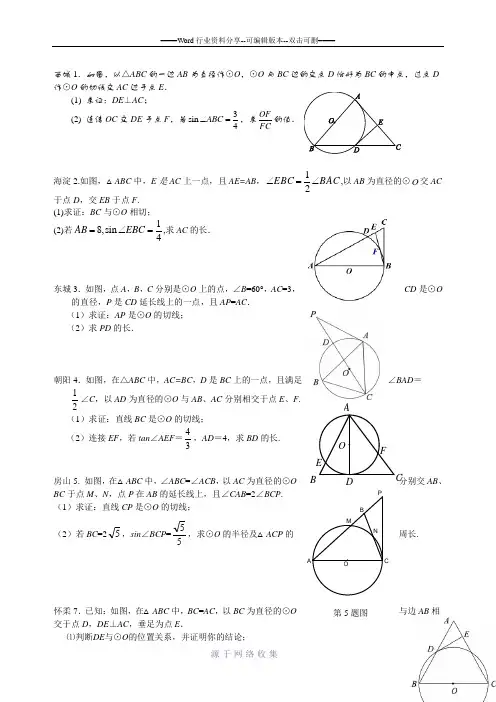
====Word行业资料分享--可编辑版本--双击可删==== 源-于-网-络-收-集 西城1.如图,以△ABC的一边AB为直径作⊙O,⊙O与BC边的交点D恰好为BC的中点,过点D作⊙O的切线交AC边于点E. (1) 求证:DE⊥AC;
(2) 连结OC交DE于点F,若3sin4ABC,求OFFC的值.
海淀2.如图,△ABC中,E是AC上一点,且AE=AB,BACEBC21,以AB为直径的⊙O交AC于点D,交EB于点F. (1)求证:BC与⊙O相切;
(2)若18,sin4ABEBC,求AC的长.
东城3.如图,点A,B,C分别是⊙O上的点,∠B=60°,AC=3,CD是⊙O的直径,P是CD延长线上的一点,且AP=AC. (1)求证:AP是⊙O的切线; (2)求PD的长.
朝阳4.如图,在△ABC中,AC=BC,D是BC上的一点,且满足∠BAD=12∠C,以AD为直径的⊙O与AB、AC分别相交于点E、F.
(1)求证:直线BC是⊙O的切线; (2)连接EF,若tan∠AEF=43,AD=4,求BD的长.
房山5. 如图,在△ABC中,∠ABC=∠ACB,以AC为直径的⊙O分别交AB、BC于点M、N,点P在AB的延长线上,且∠CAB=2∠BCP. (1)求证:直线CP是⊙O的切线;
(2)若BC=25,sin∠BCP=55,求⊙O的半径及△ACP的周长.
怀柔7.已知:如图,在△ABC中,BC=AC,以BC为直径的⊙O与边AB相交于点D,DE⊥AC,垂足为点E. ⑴判断DE与⊙O的位置关系,并证明你的结论;
FE
O
C
A
BD
MN
AC
O
PB
第5题图 ====Word行业资料分享--可编辑版本--双击可删====
源-于-网-络-收-集 ⑵若⊙O的直径为18,cosB =31,求DE的长. 解:
大兴8.已知:如图,AB是⊙O的直径,AC是弦,CD是⊙O的切线,C为切点,AD⊥CD于点D. 求证:(1)∠AOC=2∠ACD; (2)AC2=AB·AD.
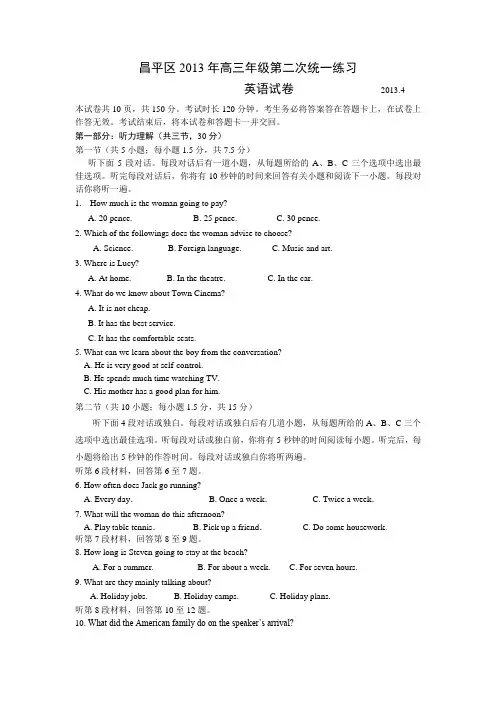
昌平区2013年高三年级第二次统一练习英语试卷2013.4本试卷共10页,共150分。
考试时长120分钟。
考生务必将答案答在答题卡上,在试卷上作答无效。
考试结束后,将本试卷和答题卡一并交回。
第一部分:听力理解(共三节,30分)第一节(共5小题;每小题1.5分,共7.5分)听下面5段对话。
每段对话后有一道小题,从每题所给的A、B、C三个选项中选出最佳选项。
听完每段对话后,你将有10秒钟的时间来回答有关小题和阅读下一小题。
每段对话你将听一遍。
1.How much is the woman going to pay?A. 20 pence.B. 25 pence.C. 30 pence.2. Which of the followings does the woman advise to choose?A. Science.B. Foreign language.C. Music and art.3. Where is Lucy?A. At home.B. In the theatre.C. In the car.4. What do we know about Town Cinema?A. It is not cheap.B. It has the best service.C. It has the comfortable seats.5. What can we learn about the boy from the conversation?A. He is very good at self-control.B. He spends much time watching TV.C. His mother has a good plan for him.第二节(共10小题;每小题1.5分,共15分)听下面4段对话或独白。
每段对话或独白后有几道小题,从每题所给的A、B、C三个选项中选出最佳选项。
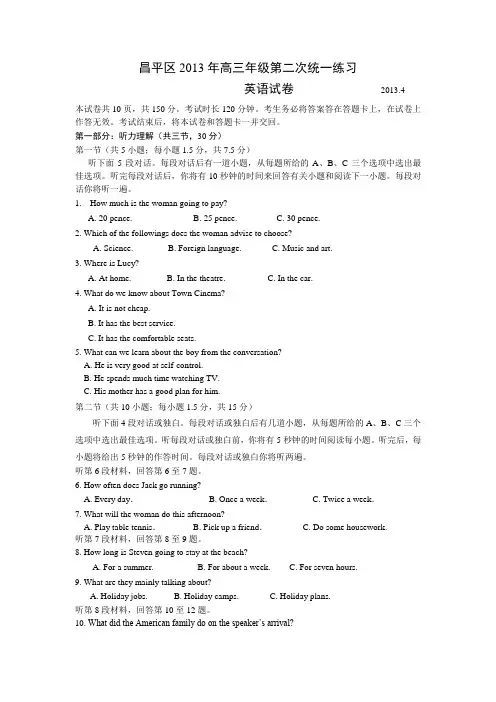
昌平区2013年高三年级第二次统一练习英语试卷2013.4本试卷共10页,共150分。
考试时长120分钟。
考生务必将答案答在答题卡上,在试卷上作答无效。
考试结束后,将本试卷和答题卡一并交回。
第一部分:听力理解(共三节,30分)第一节(共5小题;每小题1.5分,共7.5分)听下面5段对话。
每段对话后有一道小题,从每题所给的A、B、C三个选项中选出最佳选项。
听完每段对话后,你将有10秒钟的时间来回答有关小题和阅读下一小题。
每段对话你将听一遍。
1.How much is the woman going to pay?A. 20 pence.B. 25 pence.C. 30 pence.2. Which of the followings does the woman advise to choose?A. Science.B. Foreign language.C. Music and art.3. Where is Lucy?A. At home.B. In the theatre.C. In the car.4. What do we know about Town Cinema?A. It is not cheap.B. It has the best service.C. It has the comfortable seats.5. What can we learn about the boy from the conversation?A. He is very good at self-control.B. He spends much time watching TV.C. His mother has a good plan for him.第二节(共10小题;每小题1.5分,共15分)听下面4段对话或独白。
每段对话或独白后有几道小题,从每题所给的A、B、C三个选项中选出最佳选项。
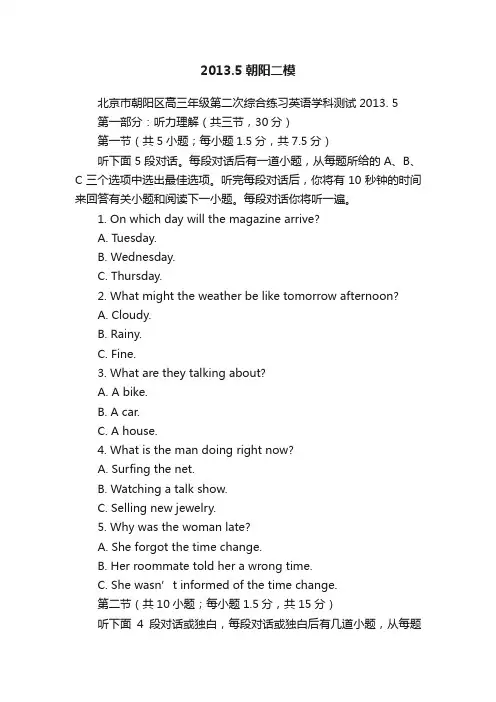
2013.5朝阳二模北京市朝阳区高三年级第二次综合练习英语学科测试2013. 5第一部分:听力理解(共三节,30分)第一节(共5小题;每小题1.5分,共7.5分)听下面5段对话。
每段对话后有一道小题,从每题所给的A、B、C三个选项中选出最佳选项。
听完每段对话后,你将有10秒钟的时间来回答有关小题和阅读下一小题。
每段对话你将听一遍。
1. On which day will the magazine arrive?A. Tuesday.B. Wednesday.C. Thursday.2. What might the weather be like tomorrow afternoon?A. Cloudy.B. Rainy.C. Fine.3. What are they talking about?A. A bike.B. A car.C. A house.4. What is the man doing right now?A. Surfing the net.B. Watching a talk show.C. Selling new jewelry.5. Why was the woman late?A. She forgot the time change.B. Her roommate told her a wrong time.C. She wasn’t informed of the time change.第二节(共10小题;每小题1.5分,共15分)听下面4段对话或独白,每段对话或独白后有几道小题,从每题所给的A、B、C三个选项中选出最佳选项。
听每段对话或独白前,你将有5秒钟的时间阅读每小题。
听完后,每小题将给出5秒钟的作答时间。
每段对话或独白你将听两遍。
听第6段材料,回答第6至7题。
6. What can you see in Hyde Park?A. Thousands of trees.B. Many small lakes.C. Classic cars.7. What does the man think is great entertainment?A. Large space.B. Horse rides.C. Open-Air Theatre.听第7段材料,回答第8至9题。
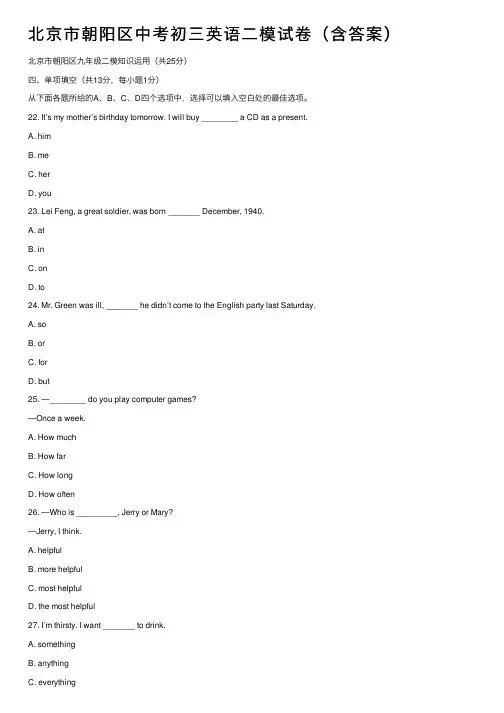
北京市朝阳区中考初三英语⼆模试卷(含答案)北京市朝阳区九年级⼆模知识运⽤(共25分)四、单项填空(共13分,每⼩题1分)从下⾯各题所给的A、B、C、D四个选项中,选择可以填⼊空⽩处的最佳选项。
22. It’s my mother’s birthday tomorrow. I will buy ________ a CD as a present.A. himB. meC. herD. you23. Lei Feng, a great soldier, was born _______ December, 1940.A. atB. inC. onD. to24. Mr. Green was ill, _______ he didn’t come to the English party last Saturday.A. soB. orC. forD. but25. —________ do you play computer games?—Once a week.A. How muchB. How farC. How longD. How often26. —Who is _________, Jerry or Mary?—Jerry, I think.A. helpfulB. more helpfulC. most helpfulD. the most helpful27. I’m thirsty. I want _______ to drink.A. somethingB. anythingC. everythingD. nothing28. —May I ask you a question?—Certainly. What’s it?A. ShouldB. WouldC. MayD. Must29. I’ll take a walk with after I finish _______ the floor.A. cleanB. cleaningC. cleanedD. to clean30. Our manager ________a long way home yesterday and it made him very tired.A. drivesB. will driveC. droveD. is driving31. Mrs. White came to our school in 1996. She _______ here for nearly 16 years.A. has workedB. worksC. will workD. worked32. We ________trees if it is sunny next Sunday.A. plantB. plantedC. have plantedD. will plant33. Lots of books _________to the poor students in the countryside every year.A. sendB. sentC. are sentD. were sent34. The child told us__________ at last and then we took him home.A. where does he liveB. where he livesC. where did he liveD. where he lived五、完形填空(共12分,每⼩题1分)阅读下⾯的短⽂,掌握其⼤意,然后从短⽂后各题所给的A、B、C、D四个选项中,选择最佳选项。
- 1 -
2013北京中考英语预测模拟试卷(一) 2013.6 知识运用(共25分) 四、单项填空(共13分,每小题1分) 从下面各题所给的A、B、C、D四个选项中,选择可以填入空白处的最佳选项。 22. ---Excuse me. Is that your bike? ---No, it‘s not _______. A. his B. hers C. yours D. mine 23. I usually get up _______ seven o‘clock every morning. A. at B. on C. in D. to 24. I have two brothers. One is a manager, _______ is a doctor. A. other B. another C. others D. the other 25. ---Would you like to play basketball with us? ---I‘d love to. But I must finish _______ my room first. A. clean B. to clean C. cleaning D. cleaned 26. There are no buses, _______ you have to go there by bike. A. so B. or C. but D. for 27. Lingling‘s English is much _______ than any other student‘s in her class. A. good B. better C. best D. the best 28. We _______ a football game with Class 2 yesterday. A. have B. had C. will have D. are having 29. ---What does your mother do to keep healthy, Tom? ---She usually _______. A. swims B. swam C. will swim D. is swimming 30. ---Listen! My sister _______ the violin. ---What beautiful music! I like it very much. A. plays B. played C. is playing D. will play 31. We didn‘t enjoy the tour _______ the weather was terrible. A. when B. if C. though D. because 32. ---Look! Mr. Brown is over there. ---It can‘t be him. He _______ away since last Sunday. A. was B. has been C. were D. will be 33. Chinese _______ at many high schools in that country today. A. is taught B. is teaching C. will teach D. was taught 34. ---Could you tell me _______ the Bamboo Garden? ---The day after tomorrow, I think. - 2 -
A. when will we visit B. when did we visit C. when we will visit D. when we visited 五、完形填空(共12分,每小题1分) 阅读下面的短文,掌握其大意,然后从短文后各题所给的A、B、C、D四个选项中,选择最佳选项。 Mary, a 22-year-old young woman, stands in the kitchen of the Edsa Shangri-La Hotel in Manila, preparing to make a cake. It would seem to be natural for a cook, but Mary is not normal. She has no 35 . Her disability (残疾), however, only 36 her down while working. Using other parts of her body, Mary can cut grapes and strawberries into pieces and coat the sides of the cake with them. ―When I first saw Mary, I was worried she might 37 herself when using a knife, but that has never been a problem,‖ says the manager of the hotel. ―She does not get 38 treatment and works just as hard as the rest of the cooks. Mary has come a long way since the day in September 2002 when she and her uncle were attacked (攻击) by two men, who were trying to force her family off their land. The 11-year-old girl passed out (晕倒) as she tried to 39 herself from the blows. After she came to her sense, she found her uncle dead and saw her arms broken. Later, the doctors did an 40 . They saved her life but could not save her hands. In 2006, with the help of the family, Mary went to live at the House with No Steps, a Manila rehabilitation (康复) and training centre for disabled people. She 41 how to write and do housework there. And more importantly, she came to terms with her disability. She believed she 42 live a normal life although she was disabled. She thought she had something important to do in life because she was still alive after the terrible attack. After she finished high school, she took a two-year Hotel and Restaurant Management 43 because she had enjoyed cooking since she was a little girl. When Mary was reported on television, she didn‘t 44 away from the attention. ―I wanted others living with disabilities to believe it‘s 45 to live a normal life,‖ Mary says. ―It is difficult to make a living, but I don‘t lose 46 . I believe nothing is impossible if you dream and work hard. 35. A. arms B. hands C. legs D. feet 36. A. puts B. takes C. slows D. quiets 37. A. hurt B. hit C. kill D. touch 38. A. enough B. special C. usual D. common 39. A. save B. keep C. prevent D. protect 40. A. operation B. examination C. introduction D. explanation - 3 -
41. A. practiced B. studied C. reviewed D. learned 42. A. would B. could C. should D. might 43. A. class B. lesson C. course D. subject 44. A. shy B. run C. hide D. turn 45. A. exciting B. excellent C. simple D. possible 46. A. direction B. hope C. love D. life
阅读理解(共44分) 六、阅读下列短文,根据短文内容,从短文后各题所给的A、B、C、D四个选项中,选择最佳选项。(共26分,每小题2分) A Top 10 Universities in Asia Ranking in Asia University Country or Area Global Ranking 1 University of Hong Kong Hong Kong 21 2 University of Tokyo Japan 26 3 Pohang University of science and Technology South Korea 28
4 National University of Singapore Singapore 34 5 Peking University China 37 6 Hong Kong University of Science and Technology Hong Kong 41